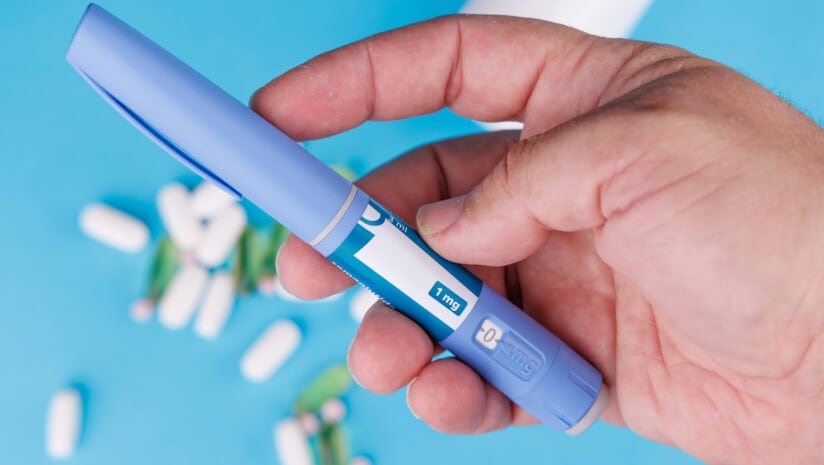In a new science review led by dietary supplement retailer GNC, the company’s science and communication team draws from the existing body of literature on obesity, weight loss trials and adiposity-related complications to propose evidence-based supplement strategies to help health care providers support comprehensive obesity treatment. These are focused on long-term health and mitigating the unintended consequences associated with GLP-1 drugs.
“Optimizing nutrient intakes with therapeutic doses of dietary supplements may enhance outcomes when used alongside GLP-1RA, such as increasing nutrient status, retaining lean mass, reducing oxidative stress and inflammation, and improving gastrointestinal health,” they wrote in the journal Obesity Pillars.
In April 2024, GNC became the first major retailer to launch a GLP-1 support program to fill nutritional gaps and support the health areas most affected in this new era of weight loss drugs.
Addressing the unintended consequences of GLP-1-RAs
This latest review builds on a journal article published in Frontiers in Nutrition earlier this year, which drew attention to the nutritional deficiencies of GLP-1 users—whether lack of vital nutrient intake through the diet or failure to meet the higher protein needs during weight loss.
In this sequel publication, the GNC research team highlights the need for better nutritional guidance, drawing parallels between the current knowledge gaps in GLP-1 patient care and the early days of bariatric surgery, when dietary education was similarly wanting.
“A recent publication found within a 6-month window, bariatric surgery declined 8.7 % and GLP-1RA prescriptions increased 105.6 %,” they noted. “The significant increase in GLP-1RA adoption further highlights the need to provide evidence-based recommendations for GLP-1RA treatment.”
The review positions dietary supplementation not as competing with healthy diet or pharmaceutical intervention but as adjunct to enhance treatment and counter both the negative side effects and longer-term consequences of suboptimal obesity treatment (much like combining antibiotic treatment with probiotics). Repercussions might include the risk of weight cycling, sarcopenia with aging, compromised quality of life and reduced functional health.
Noting that nutritional interventions alongside GLP-1RA treatments are in their infancy, the research team expands upon existing practice guidelines on nutritional considerations and priorities for individuals using GLP-1s to establish a more complete set of supplement recommendations for optimizing overall health outcomes beyond side effect management and basic dietary guidance.
“From previous weight loss studies, key areas of unintended consequences appear to be poor nutrient status, losing significant amounts of muscle mass, slowing metabolic rates and metabolic dysfunction,” they reported. “Further, managing nausea, vomiting and diarrhea side effects, associated with GLP-1RA use should be considered as part of the MNT [Medical Nutrition Therapy] patient-centered care.”
The review explored a range of strong, moderate and emerging evidence on the deficiency- and consequence-fighting potential of multivitamins, vitamin D, omega-3 fatty acids, proteins, HMB, creatine, fiber, probiotics and thermogenic, antioxidant and anti-inflammatory ingredients. It also called for future randomized clinical trials to assess the efficacy and safety of combining dietary supplements with GLP-1 treatments.
Key GNC takeaways on the potential of supplement strategies to support GLP-1 patients
- Multivitamins, vitamin D and omega-3 or fish oil supplements can fill nutrient gaps from dietary intake, increase suboptimal serum nutrient levels and potentially offer long term health benefits.
- Protein, whey, creatine and HMB supplementation can preserve lean mass while building muscle strength during weight loss.
- Thermogenic, antioxidants and anti-inflammatory dietary supplements can support metabolic function and reduce oxidative stress and inflammatory markers.
- Fiber and probiotic supplements can reduce constipation and improve stool consistency, a common side effect of GLP-1RA.
Towards personal, evidence-based care for optimized health outcomes
The GNC researchers, all of whom are registered dietitians, acknowledged that whole foods should be the first line of defense for meeting nutritional needs. However, they cautioned that using food as the only strategy may lead to missed opportunities—particularly given the reduced caloric and nutrient intake resulting from GLP-1 appetite suppression.
“A joint advisory from four U.S. health agencies provides guidance on nutrient adequacy from fruits, vegetables, whole grains, lean proteins and legumes while limiting refined carbohydrates, sugary beverages and processed foods with GLP-1RA treatment,” they wrote. “The guidelines mention that dietary supplements can be considered to mitigate nutrient [deficiencies], manage GI side effects and preserve muscle mass. While these are initial steps in synthesizing relevant data to guide patients using GLP-1RAs, they lack comprehensive guidance for considering dietary supplementation to help optimize outcomes.”
The review also noted the need for a paradigm shift from adequate intake to optimal intake—where adequate nutrient intake represents the level required to prevent deficiencies and chronic disease and optimal nutrient intake “extends beyond those requirements and considers levels necessary to achieve peak physiological function, provide health benefits and further disease prevention.”
“Relying solely on standard DRIs [Dietary Reference Intakes] may be outdated, as some research finds higher therapeutic doses support better health outcomes,” the researchers wrote, emphasizing that patients using GLP-1RA to treat obesity should receive individualized, evidence-based care.
Source: Obesity Pillars. doi: 10.1016/j.obpill.2025.100209. “Dietary supplement considerations during glucagon-like Peptide-1 receptor agonist treatment: A narrative review”. Authors: Brittany Johnson et al.




